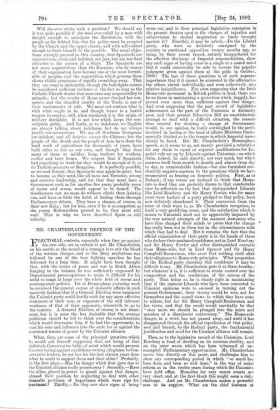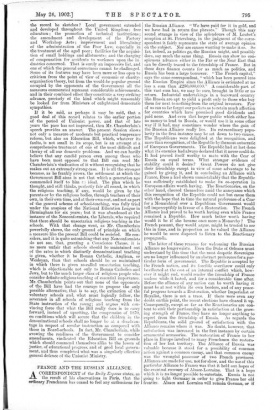MR. CHAMBERLAIN'S DEFENCE OF THE GOVERNMENT.
ELECTORAL contests, especially when they go against his own side, are as certain to put Mr. Chamberlain on his mettle as the sound of a trumpet is to stir the blood of the veteran charger, and so the Bury misfortune was followed by one of the best fighting speeches he has delivered for a long time. It might have been thought that, with the issues of peace and war in South Africa hanging in the balance, be was sufficiently engrossed by Departmental preoccupations to make it difficult for his mind to range at. large over the whole field of recent and contemporary politics. Yet at Birmingham yesterday week he reviewed the general course of domestic affairs in such masterly fashion that if a General Election were imminent the Unionist party could hardly wish for any more effective statement of their case, or exposure of the still inherent weakness of that of their opponents, wherewith to go to the country. A General Election, of course, is not immi- nent, but it is none the less desirable that the average politician should be led to think over the considerations which would determine him, if he had the opportunity, to cast his vote and influence into the scale for or against the continued tenure of power by the Unionist alliance.
What, then, are some of the principal questions which he would ask himself supposing that, not being of that definitely Conservative habit of mind which would prevent his ever voting against candidates owning allegiance to Con- servative leaders, he yet has for the last sixteen years done what he could to support them and their allies? Probably, in the first place,—Has the danger which first gave rise to the Unionist alliance really passed away ? Secondly,—Have the allies, placed in power to guard against that danger, abused their position by neglecting to deal with other domestic problems of importance which were ripe for treatment ? Thirdly,—])o they now show signs of being worn out, and is their principal legislative enterprise in the present Session open to the charges of injustice and subservience to clerical inspiration so freely brought against it ? Fourthly, it may be asked,—Do the Liberal party, who were so decisively consigned by the country to continued opposition twenty months ago, as being, by their recent record, entirely incapacitated for the effective discharge of Imperial responsibilities, show any such signs of having come to a single or a sound mind that it could conceivably be safe to reverse the popular judgment given against them at the polls in October, 1900? The last of these questions is of such supreme importance that if it cannot be answered in the affirmative the others shrink individually, and even collectively, into relative insignificance. For, even supposing that the Irish Home-rule movement in British politics is dead, there can be no harm in maintaining a protection which, happily, has proved even more than sufficient against that danger. And even supposing that the past record of legislative achievement on the part of the Unionists is distinctly poor, and their present Education Bill an unsatisfactory attempt to deal with a difficult situation, the reasons thus created for desiring a change of Government would, in our opinion, be vastly outweighed by the perils involved in having at the head of affairs Ministers funda- mentally divided as to the temper in which Imperial issues should be faced. But Mr. Chamberlain's Birmingham. speech, as it seems to us, not merely provided a refutation for any claim to equal or superior qualifications for Im- perial rule set up by Liberals against Unionists—on which claim, indeed, he said, directly, not very much, but which answers itself from month to month, and almost from day to day, in unmistakable fashion—but also furnished con- clusively negative answers to the questions which we have enumerated as bearing on domestic politics. First, as to Ireland ; if any voters are inclined to think that Home- rule is dead they are probably drawn to that comfortable view by reflection on the fact that distinguished Liberals like Lord Rosebery and Sir Henry Fowler, who for many years were leaders of a party pledged to that policy, have now definitely abandoned it. Their conversion from the error of their ways is, as Mr. Chamberlain recognises, in itself a very gratifying event, and the satisfaction which it causes to Unionists need not be appreciably impaired by the very natural attempts of the eminent statesmen who have thus changed their minds to prove that the change has really been not in them but in the circumstances with which they had to deal. But it remains the fact that the official organisation of their party is in the hands of those who declare their unabated confidence, not in Lord Rosetery and Sir Henry Fowler and other distinguished converts from Home-rule, but in Lord Spencer and Sir Henry Campbell-Bannerman, who avow that nothing shall alter their allegiance to Home-rule principles. What proportion of the Radical party cherishes this confidence it may be difficult to say. Mr. Chamberlain puts it at three-fourths ; but whatever it is, it is sufficient to retain control over the composition and the resolutions of the caucus of the party. That being so, he is clearly right in maintaining that if the eminent Liberals who have been converted to Unionist opinions were to succeed in turning out the present Government, their victory would be won, not for themselves and the sound views to which they have come to adhere, but for Sir Henry Campbell-Bannerman and his views, and that the result would inevitably be that "once more we should be plunged into the mists and marshes of a disunionist controversy." The Home-rule danger, in a word, has not passed away, and until it has disappeared through the official repudiation of that policy, root and branch, by the Radical party, the fundamental justification and need for the Unionist alliance will remain.
Then, as to the legislative record of the Unionists, Lord Rosebery is fond of dwelling on its extreme sterility, and on the utter waste which has been witnessed of un- exampled Parliamentary opportunities. Mr. Chamberlain meets him directly on this point, and challenges him to show any corresponding period in which "so much has been done, and been so well done," in the way of social reform as in the twelve years during which the Unionists have held office. Memories for very recent events are very short, and at the first blush this might seem a risky challenge. And yet Mr. Chamberlain makes a powerful case in its support. What are the chief features of the record he sketches ? Local government extended and developed throughout the United Kingdom ; free education ; the promotion of technical institutions ; the amendment and development of the Factory and Workshop Acts ; improvement and liberalising of the administration of the Poor Law, especially in the treatment of the aged poor; facilities for the acquisi- tion of small holdings and allotments; and the charging of compensation for accidents to workmen upon the in- dustries concerned. That is surely an impressive list, and one of which the general correctness cannot be challenged. Some of its features may have been more or less open to criticism from the point of view of economic or charity- organisation theory, but from the would-be popular ground occupied by the opponents of the Government all the measures enumerated represent considerable achievements, and in their combined effect they constitute a very striking advance, precisely of the kind which might reasonably be looked for from Ministers of enlightened democratic sympathies.
If it be said, as perhaps it may be said, that a good deal of this record relates to the earlier portion of the period of Unionist power, and that of late years the pace has not improved, then Mr. Chamberlain's speech provides an answer. The present Session shows not only a measure of moderate but practical temperance reform, but also an Education Bill, which, whatever its faults, is not small in its scope, but is an attempt at a comprehensive treatment of one of the most difficult and thorny of all our domestic problems. And we can hardly believe that any candid person even among those who have been most opposed to that Bill can read Mr. Chamberlain's vindication of it without recognising that he makes out an extremely strong ease. It is all the stronger because, as he frankly avows, the settlement at which the Government Bill aims is not that which a generation ago commended itself to him n3 ideal. The plan which he thought, and still thinks, perfectly fair all round, in which the religious teaching, if any, would be a by the parents or by the religious bodies, through teachers of their own, in their own time, and at their own cost, and not as part of the general scheme of school-teaching, was fully tried under the auspices of the National Education League in Birmingham for six years ; but it was abandoned at the instance of the Nonconformists, the Liberals, who required that there should be unsectarian religious teaching in the schools. With that change went, as Mr. Chamberlain powerfully shows, the only ground of principle on which a measure like the present Bill could be resisted. He con- siders, and it is quite astonishing that any Nonconformists do not see, that, granting a Conscience Clause, it is no more unfair that schools should be maintained out of the rates in which distinctly denominational teaching is given, whether it be Roman Catholic, Anglican, or Wesleyan, than that schools should be so maintained in which there is given so-called unseetarian teaching, which is objectionable not only to Roman Catholics and Jews, but to the much larger class of religious people who consider definite religious teaching of essential importance. Mr. Chamberlain points out that none of the opponents of the Bill have had the courage to propose the only possible alternative, that is to say, the extinction of the voluntary schools and, what must logically follow, the severance in all schools of religious teaching from the State instruction of the young ; and argues with con- vincing force that what the Bill really does is to carry forward, instead of upsetting, the compromise of 1870, on conditions which will secure that the children in the denominational schools shall no longer be at a disadvan- tage in respect of secular instruction as compared with those in Board-schools. In fact, Mr. Chamberlain, while avowing the readiness of the Government to consider amendments, vindicated the Education Bill on grounds which should commend themselves alike to the lovers of justice, of educational progress, and of pod local govern- ment, and thus completed what was a singularly effective general defence of the Unionist Ministry.







































 Previous page
Previous page